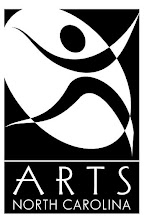The Arts Education Comprehensive Plan Task Force met today in Raleigh for their first meeting and began the arduous task of creating a plan to address arts education needs in public schools K-12... by December 1.
This message is being sent as a personal reflection from ARTS North Carolina staff and should not be read as formal minutes or as a definitive direction of the Committee. Any responses to this listserv message will be compiled and passed on to Committee leadership.
The five-hour meeting began with an overview of the Basic Education Plan, which was actually adopted by the North Carolina General Assembly in 1984 with final revision in 1995. The BEP, if it had been funded, would have created a dynamic platform of creativity and progressive education in North Carolina. Arts education language is clear and directive in the BEP, which still remains a law in North Carolina.
NCDPI also provided information on funding formulas and how money is allocated based on number of students and types of instruction.
The work of the Committee began in earnest in break-out sessions, and several themes emerged that will be addressed at future meetings:
- Restoring and funding art education
- What exactly is a mandate?
- How would arts education be accountable?
- Who is teaching arts education: highly qualified licensed arts educators or classrooms teachers? What does this mean in actuality, and why is this question relevant?
- How can a comprehensive plan be sustained throughout a child's entire education, K-12?
- What is the role of our higher education system in training teachers and supporting arts education?
- How are different learning styles addressed through arts integration, specifically the A+ Schools program and any other national models?
- What are models of implementation, and how are districts that have requirements managing in today's economy?
- What are the benefits of arts education specifically related to drop-out rates and workforce preparedness, and how can they be articulated?
- How can arts education partner with STEM initiatives (Science, Technology, Engineering, and Math)? (One visionary Committee member clearly stated, "one will not work without the other".)
If you would like to see how these questions and powerful issues will be addressed by the Task Force, you can attend any of the meetings as an observer:
- October 5 – NC Archives and History – 10am - 3pm
- October 21 – NC Archives and History – 10am - 3pm
- November 10 – NCDPI – 10am - 3pm
Also, if you have not encouraged your candidates for North Carolina Senate and House to complete ARTS North Carolina's survey, please do so by directing candidates to: http://tiny.cc/election_survey.
85% of the 58 responses so far answered "yes" to this question: Will you support funding and legislation that make the arts part of the core curriculum and after-school learning opportunities?
